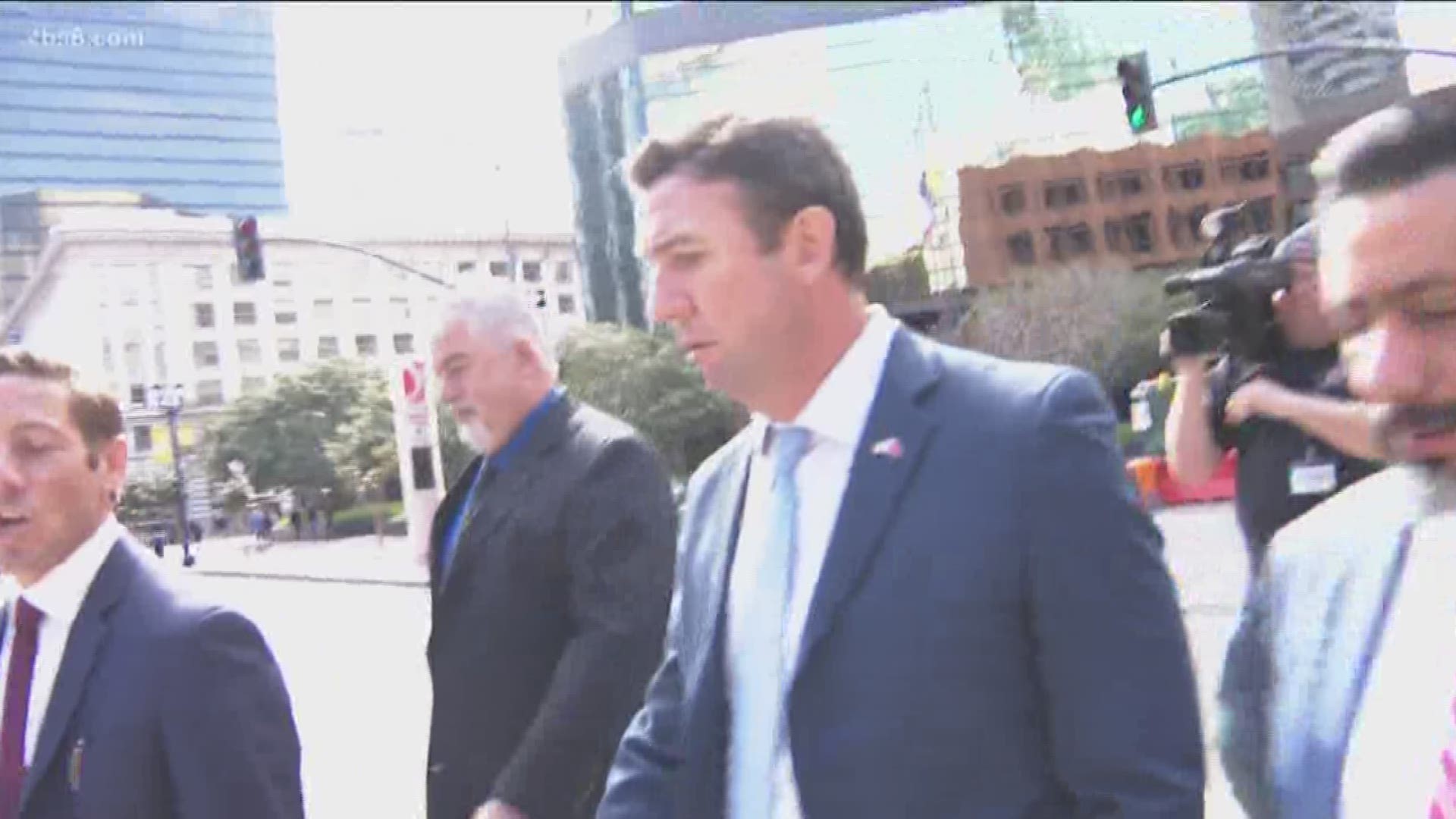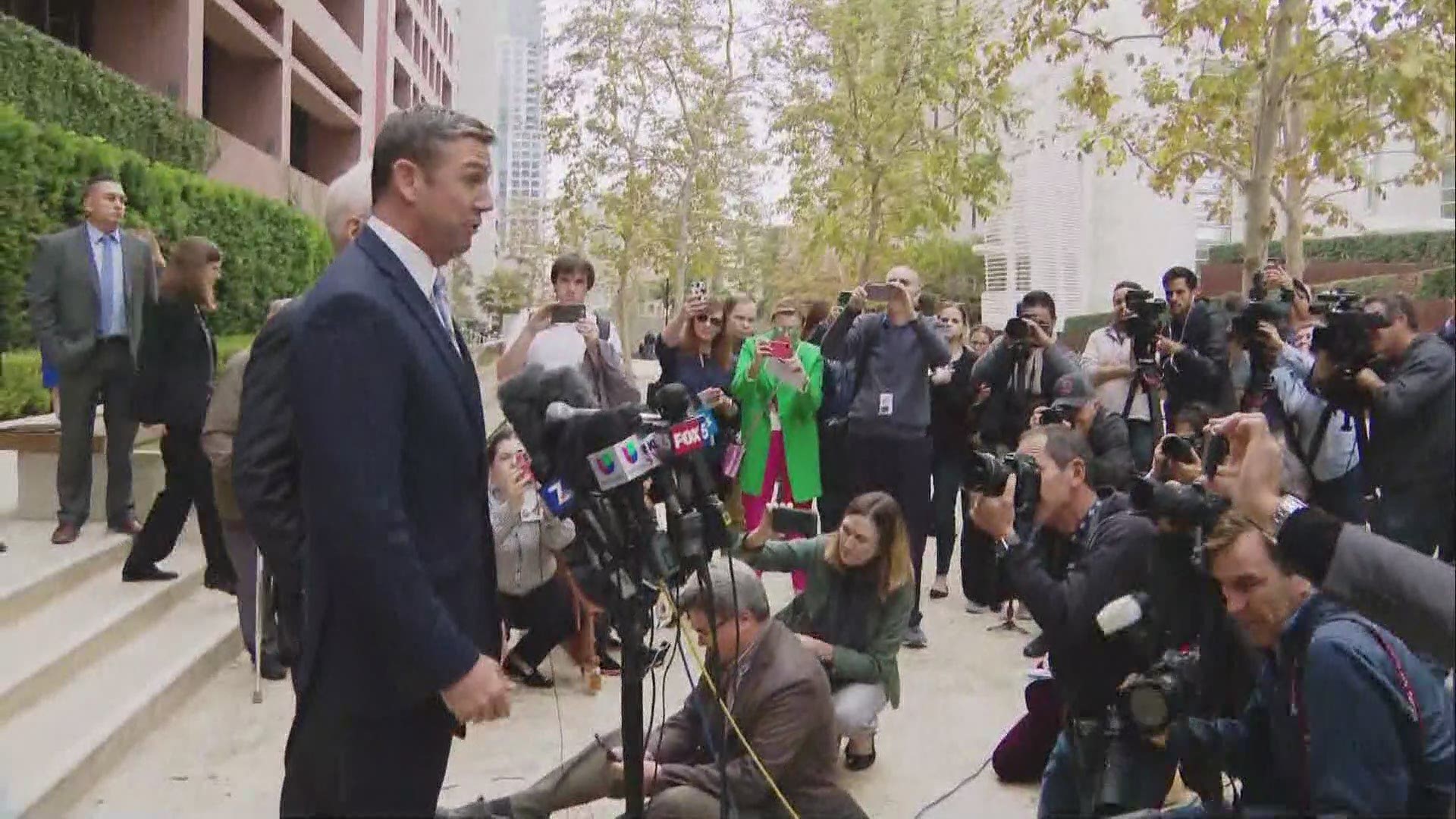SAN DIEGO — Former Rep. Duncan Hunter was sentenced to 11 months in federal prison Tuesday for misusing campaign funds to support years of personal expenditures.
The former lawmaker admitted in last year's guilty plea to a conspiracy charge for spending hundreds of thousands of dollars with campaign credit cards on family vacations, restaurant and bar tabs, clothes and other frivolous expenses over the course of several years, while falsely stating to his staff that the purchases were campaign-related.
Hunter's wife and former campaign manager, Margaret, 44, also pleaded guilty last year to misusing campaign funds and was due to be sentenced next month. The couple were charged in 2018 in a 60-count indictment.
Hunter, 43, must also go on three years of supervised release after his term is up. He was ordered to surrender to authorities on May 29.
Prior to sentencing, Hunter addressed the court, saying he took "full responsibility for any dime spent on my campaign by me or anyone else."
He also asked U.S. District Judge Thomas Whelan for leniency and sympathy when he sentences "the mother of my children," asking the judge not to give Margaret Hunter custody "if it's possible."
Prosecutors asked Whelan to impose a 14-month prison sentence, while Hunter's attorneys asked for 11 months of home confinement, plus 1,000 hours of community service.
RELATED: Duncan Hunter resigns from Congress
Defense attorney Paul Pfingst argued that Whelan should take Hunter's service in the Marines into account, as well his contributions in Congress, arguing that "on balance, Duncan Hunter has contributed much to his country, his constituents and his children."
Pfingst reminded the court that "not a single dollar of taxpayer money" was taken by Hunter and also took umbrage with what he said was the prosecution's assertion that Hunter "betrayed his office" or represented "a threat to democracy."
Assistant U.S. Attorney Phillip Halpern said that Hunter "abused his position from the very beginning" of his political career, noting that the misuse of campaign funds began in 2009.
The prosecutor argued that Hunter "had every advantage that an American citizen can have," yet chose to dip into campaign funds on a regular basis, with full knowledge of his wrongdoing.
In the prosecution's sentencing memorandum, it states the Hunters were "virtually penniless" and amid dire financial straits, resorted to using campaign credit cards to support "a profligate lifestyle leading to continual debt and an ever-increasing need to find cash to pay bills."
Despite the family bank account not carrying a positive balance throughout any single month between 2009 and 2017, prosecutors say the family lived extravagantly, racking up thousands on expensive family trips and scores of other improper personal purchases, according to the memorandum.
It was also alleged that Hunter used campaign funds to pursue extramarital affairs and repeatedly used campaign credit cards or sought reimbursement for expenses that included resort hotel rooms, airfare, a skiing trip and Uber rides to and from the homes of five women with whom he had "intimate relationships."
He also gave his wife a campaign credit card despite her having no official role in the campaign, until he later hired her as campaign manager amid protests from members of his staff, according to the prosecution's court filings.
Halpern argued in court that a heavier sentence was needed to offset the public perception that "those who write the laws feel that they are above the laws."
Hunter, a Republican who represented California's 52nd congressional district from 2009-13 and 50th congressional district from 2013-20, had planned to seek another term.
He repeatedly and publicly denied wrongdoing and accused the U.S. Attorney's Office of a politically motivated prosecution. He maintained that two prosecutors on the case attended a La Jolla campaign event for Democratic presidential candidate Hillary Clinton in 2015, then indicted him two months before the 2018 election due to his public endorsement of Donald Trump in the 2016 election.
Former congressman Duncan Hunter Sr., who attended the sentencing, addressed reporters outside the San Diego federal courthouse, and said he had lodged a citizen's complaint against the two referenced prosecutors, Emily Allen and Alana Robinson.
The elder Hunter argued the prosecutors violated the Hatch Act, which restricts federal employees from participating in partisan political activity. Whelan previously denied defense motions seeking that the Southern District of California recuse itself from the prosecution over conflict of interest concerns.
Hunter pleaded guilty on Dec. 3, and in a brief statement to reporters, said "I failed to monitor and account for my campaign spending. I made mistakes and that was what today was all about."
The congressman said in a television interview that he was taking the plea deal for the sake of his three children.
He resigned from Congress in January.
Amid the charges and public allegations, Hunter was re-elected in November 2018 with 51.7% of the vote, despite being indicted three months prior. He was first elected in 2008, succeeding his father, who held the congressional seat for 28 years.


